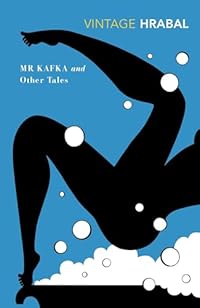Mr Kafka And Other Tales by Bohumil Hrabal
Posted in Other fiction, Reading Reviewed at 12:00 on 24 August 2022
Vintage Classics, 2019, 150 p, including 6 p Translator’s Afterword. Translated from the Czech by Paul Wilson.

These are stories set in and around Prague in the late 1940s and early 1950s when the city was still recovering from the Second World War. Several of them are situated in a steel works with apparently no safety protocols and with workers culled from various former walks of life. Misogynistic attitudes which in those days would have been unquestioned do not bear much scrutiny to the modern eye.
Concentrating on ordinary encounters and snatches of conversation exhibited in all their bizarrerie Hrabal achieves a kind of heightened realism, emphasising that nothing is truly ordinary, the grimmest of industrial settings assuming a fantastical aspect. In the circumstances that pertained in that time and place, though, the ordinary bordered on the subversive. At bottom, resorting to the ordinary is the only defence against oppression, authoritarian or otherwise.
In Mr Kafka a character named Franz Kafka strolls the streets of Prague describing all the strange encounters he has.
Strange People concerns a labour dispute in the steel works, riffs ironically on the worker’s State and provides a glimpse into the many ways in which people cope with their working environment.
The putative Angel is the overseer of a penal workforce who likes to think of himself as protecting his charges. They themselves perform small acts of human consolation as they get on with their work.
In Ingots a merchant and a doctor of philosophy discuss the times as they load up hoppers with scrap metal while a woman meant to be starting a jail sentence the next day has to succumb to the (lack of) comfort of strangers. The doctor of philosophy says, “And what’ll become of you? The same as all this scrap. The tools of your trade … you’ll be ingots too. This new age is melting you all down.”
A Betrayal of Mirrors presents fragments of a hot summer, boys practising the Czech wall pass, a stonemason repairing a statue of St Jude Thaddeus, submissions to an art exhibition, schoolchildren’s responses to the question of how to make the country an even more beautiful place, the preparations for the demolition of a statue of a figure referred to as the Generalissimo (but in reality Stalin.)
Unusually for this book Breaking Through the Drum is a single-stranded narrative which it is tempting to look on as an allegory of the Cold War. In it, amid some philosophising about the moral nature of ticket collecting, a conscientious ticket collector who has worked himself up to ticket taker for the Prague Municipal Symphony Orchestra in the Waldstein Gardens, which is separated from the St Thomas brewery, where Mr Polata’s Sumava Regional Brass Band plays in the beer garden, by a high wall, the two seemingly in competition, uses a ladder one evening to look over the wall. He sees the beer garden is overlooked by a former monastery now a home for old women and he perceives the patrons there are dancing “for the old women to see, these women who no longer had anyone to touch, who would never again be embraced that way, which was why the old women’s eyes sparkled as they did, why they glowed with longing and envy and resentment; and I saw that there were walls not just dividing symphonic music from brass music, but people from people as well, walls far more real than the one I was sitting on.”
Sharing as narrator the same Kafka as the first story in this collection Beautiful Poldi is Hrabal’s hymn to the steelworks to which he was assigned in the “Putting 77,000 to Work” scheme introduced by the post-war Communist government. Apart from featuring overheard observations on the bus to work and dialogue between Kafka and his colleagues we also see the nightly performance of a woman in the next-door convict barracks, well aware of her male audience peering through the knotholes in the fence. In the end though, “Everything exists in the elasticity of perspective, and life itself is illusion, deformation, perspective ….”
Pedant’s corner:- Translated into USian, organdie (organdie,) “the one who hung himself” (does this confusion between ‘hung’ and ‘hanged’ exist in Czech?) a missing end quotation mark, “reached into to the aquarium” (no ‘to’ needed,) “lay it against his cheek” (past tense, laid it,) “where the part ran through his thick hair” (parting,) “put then into a box” (put them,) “like a aureola” (an aureola.) “Aw shucks” (does not seem to me to be a likely Czech expression,) wolfram (that metal’s modern name in English is tungsten.)
Tags: Bohumil Hrabal, Czech Fiction, Mr Kafka And Other Tales, Translated fiction
